Camping can be a leisurely activity, but it can also be a beneficial way to learn survival skills you may need to use in an emergency.
Have fun camping with your family while you’re secretly preparing them for the worst. There are many things you might want to take on your camping trip, but there are a few must-have items you need in your camping gear arsenal.
Make sure you have these, and then add more as you perfect your personal camping style.
4-Person Tent, Green Camping Sleeping Bag
Camping Sleeping Bag  Ultralight Air Sleeping Pad
Ultralight Air Sleeping Pad  LED Headlamp Flashlight
LED Headlamp Flashlight ![Best Camping Gear For Your Next Adventure 8 GearLight LED Headlamp Flashlight S500 [2 PACK] - Running, Camping, and Outdoor Headlamps - Best Head Lamp with Red Safety Light for Adults and Kids](https://images-na.ssl-images-amazon.com/images/G/01/associates/remote-buy-box/buy3.gif)
What Camping Gear Do You Need?
When you’re going camping, what stuff do you really need? Some people love to be overprepared for just a weekend trip, while others don’t mind keeping it simple, even on those longer trips.
In reality, what you bring with you on your next camping trip is a matter of preference and the type of camping you’re doing. If you’re backpacking for a week, your needs are different than if you’re car or RV camping.
However, we’ve got some thoughts to help you pack what you need to be reasonably comfortable. If you want more or less, that’s up to you.
1. The Weekend Away
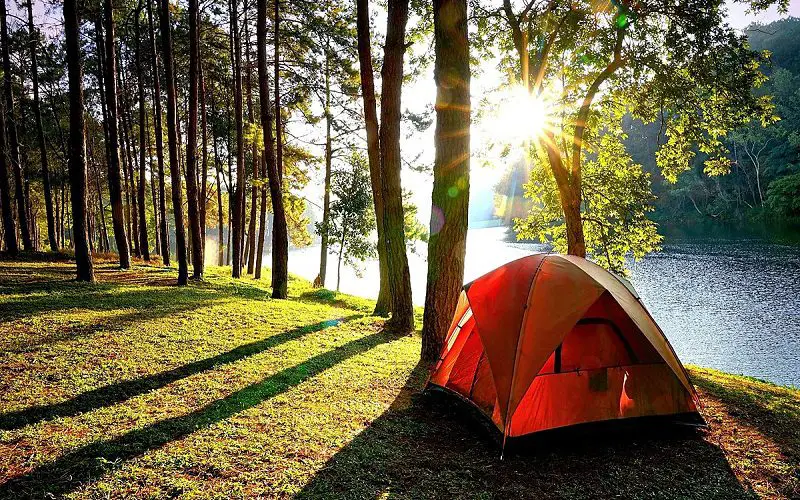
This is really the time to keep it minimal, even if you’re car or RV camping.
You don’t need a ton of stuff for a weekend away, but we frequently encounter friends or camp neighbors who have brought everything but the kitchen sink for a quick weekend camping trip.
You, of course, need the basics like food, water, clothes and toiletries, a tent, sleeping bags, and a bedroll, but here’s a list of other useful items that you should bring along.
- Camp Cooking Kit: You’ll need something to cook your meals in, so don’t forget to bring your camp cook kit. Utensils are the only thing missing, so don’t forget to pack tools to eat and stir with.
- Camp Stove: Sure, you can cook over your campfire, but not all of us are great at that skill. So, for an easy option and one that will ensure that you won’t have a weekend of burned food.
- Lighting: You’ll probably need some sort of light to help you find your way to the bathroom or to light your tent, so don’t forget a lantern or a headlamp.
- Coffee Maker: Start your morning right with a hot cup of coffee. French press coffee makers are a wonderful option for camping. They are lightweight and make a wonderful cup of coffee. The stainless steel construction ensures it won’t break if dropped, and it will keep your coffee warm.
- Camp Chair: You probably don’t want to sit on the ground, a rock, or a log, so don’t forget the camp chair.
2. Camping Vacation

For those longer camping trips, you’re going to want to bring some extra stuff along.
Obviously, if you are going to be living from a backpack, you probably don’t want much more than the options that we’ve listed above, but if you’re going to be camping from your car, you probably want to bring a few more luxuries.
Of course, you still want the basics that we’ve already mentioned, but here are some other goodies that you’ll want to bring along for a camping vacation.
- Camp Cooking Kit: Upgrade from the compact version to something a bit more versatile, including eating and cooking utensils.
- Camp Stove: A multi-burner stove is another upgrade to consider if you’re going camping for your next vacation. It should be light, portable, and have at least two burners to cook a tasty meal.
- Cooler: For those longer trips, you’re going to want more food, and probably something that’s going to require some cooling. So don’t forget to have a sturdy cooler.
- Coffee Maker: For those longer trips, you might want to upgrade your coffee maker.
- Lighting: Sure, a headlamp will do for short trips, but if you’re on an extended stay, you might want to have a lantern instead.
- Camp Cot: No one wants to sleep on the ground, even on a decent bed roll, for more than a few days. Investing in a sturdy camping tent will make any extended camping trip more enjoyable.
- Camp Chair: If you’re planning a longer trip, it’s advisable to invest in a more comfortable chair. It should be roomier than your basic chair and have a great side table for setting your drink, book, and food on.
- Canopy: Look for an option that is easy to set up and take down. You never know what the weather might bring, so make sure you have a bit of protection from the elements.
- Shower: You may not need this one, but if your stay is more than a few days and you aren’t in a developed campground, you’ll probably want a shower.
3. For Longer Trips

If you plan to be away for more than ten days, you’re a hard-core camper. If you’re doing this in a tent, we commend you for your fortitude!
However, we understand that many of you are making the long-haul trip in an RV or camping trailer. For these long-haul trips, we’d certainly recommend all of the items on the three- to ten-day list, plus a few added extras.
- Water Purifier: It should provide you with plenty of water for a few days, as well as the ability to filter more if needed.
- Tarp: This is probably handy to have on those mid-length trips, too, but certainly if you are tent camping for an extended period, you’re going to want a tarp. Tarps are handy for covering gear, creating an extra canopy, or keeping your tent floor dry.
- If you’re going to be away for a long time, don’t forget to bring a solar charger. You never know when you’ll need a backup source to charge your phone, even if your RV or electric vehicle has a generator. Cell phones are useful to have in an emergency, but they don’t do you much good if their battery dies.
- Other fun stuff: that handy bug zapper we mentioned earlier in this article, and a hammock for more relaxed lounging.
4. When Doing Water Sports
Life Jacket
- US Coast Guard-approved adult life jacket
- Great for boating, tubing, swimming, and water sports
- Soft and durable nylon shell and lightweight PE flotation...
If you have the option of choosing only one item to use for different activities on the water, then a life jacket is a must-have. It is critical that you wear a life jacket since it helps you stay afloat and prevents you from drowning.
More importantly, it may save your life if you are involved in an accident. Even if you are a competent swimmer, you still need a life jacket to save you if the weather is unpleasant.
For example, if your kayak capsizes as a result of strong winds, you will have a greater chance of surviving when wearing a life jacket. Make sure the jacket you get fits well and is comfortable.
Protective Clothing

You must have appropriate clothing before you get into the water. For instance, if you think you will spend a long time in the water, try to get a wetsuit that covers your body from head to toe.
The purpose of this suit is to shield you from the cold water. The materials used to make wetsuits possess ideal thermal characteristics. This suit’s tight fit protects your body from long-term saltwater exposure.
A dry suit is another piece of gear you can consider, since it is designed to keep you dry. It also provides warmth to the divers. Other types of drysuits are lightweight and allow simple movement.
They are perfect for activities like kayaking and windsurfing if you want to remain dry while performing different activities on the water.
Stand Up Paddle Board
A stand-up paddle board (SUP) allows you to perform different activities on the water. SUP boards have traditionally been known to be heavier, but you can always go for a lighter option in the form of an inflatable SUP.
The benefits of inflatable SUPs are countless; one of the biggest benefits is that they are quite lightweight, making them the easiest to transport to different places. For example, an inflatable SUP only weighs 8 kg, whereas a traditional hardboard can weigh between 15 and 20 kg.
Additionally, it is simple to store because you can deflate it after use and store it in your car’s trunk. Durable material makes up inflatable SUPs, making them suitable for use in a variety of conditions.
Waterproof Bag

When going on a watersports adventure, you must have a waterproof bag for storage of your valuable possessions, such as your phone, car keys, wallet, and others.
It is essential to keep all your belongings in a safe place, especially the ones you constantly use. Splashes are inevitable when kayaking, so be prepared.
You can choose a water-dried bag that is big enough to fit sweaters, a blanket, or other items you may need for your adventure.
Cutting Tool
- Dimensions - Overall Length: 8.5"(216mm); Blade Length:...
- Full-Tang Construction - Full tang design has more excellent...
- High-Quality - Blade is made of premium D2 steel for...
A sharp object like a knife can be dangerous if you don’t handle it properly, but it is a necessity when you want to perform activities like swimming, paddling, or boating.
When in deep water, a knife can help you untangle. You can use it to clear your way so you can move to safety.
When choosing a camping knife, you need to consider things like size and storage. You must have a proper sheath to keep your knife in.
Water
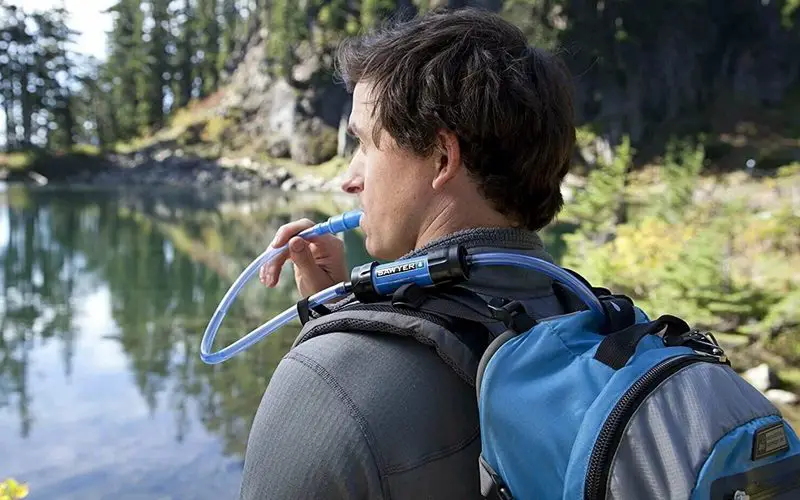
Even though water surrounds you when participating in various sports, you still need to bring potable water for drinking. Watersports offer a wealth of fun and excitement, yet they also require strenuous physical activity.
Therefore, you should prioritize hydration. Make sure you choose an appropriate container to carry your water. A stainless steel water carrier with cooling properties would be perfect for your adventure. It should have a simple carrying strap.
Swimming, snorkeling, surfing, and paddling are forms of physical exercise that require your body to be constantly hydrated. You must drink at least 8 ounces of water before the session and consume even more while exercising.
Snorkeling Gear
If you enjoy scuba diving, then snorkeling gear is one of the most important items to include on your camping list.
A snorkel’s design allows you to breathe without the need for a scuba tank or lifting your head out of the water. This equipment is quite affordable, which is a plus. All age groups can enjoy snorkeling.
You need only a diving mask and a snorkel to get a glimpse of the beautiful creatures beneath the waters. Make sure your face mask covers your nose and eyes so you can enjoy the best views without irritation.
Action Camera With Waterproof Case

Water sports are exciting, and they make your camping expedition all the more memorable. Therefore, you should pack your action camera to capture every moment while enjoying the water with your family or friends.
There are different types of cameras available on the market, so you must choose the model that suits your needs. Make sure you have a waterproof case to protect your camera. You can also use this gadget to capture breathtaking images underwater.
You also need to ensure that your camera has an appropriate strap and extra batteries. Be prepared for the adventure, because running out of power can knock on your morale.
Packing Your Gear
When we camp, we like to keep our gear dry, protected from critters, and not squished. Multi-day trips, especially if you are car camping, can benefit from some effective gear organization.
Good organization will free up room in your vehicle, keep you from accidentally forgetting something, and make storing your gear after your trip a breeze.
How do you accomplish this feat? Well, your best bet is to invest in some excellent storage bins.
You can pack similar gear into separate bins, which will keep you organized, all of your gear together, and most importantly, protected from those rainy nights and pesky critters.
When shopping for bins, you’ll want to consider size and portability. Make sure the bins will fit easily into your trunk or cargo area, and we would certainly suggest that you find containers that have handles.
If you have a strong interest in organizing, you might consider finding bins that are specifically designed to fit into these containers. This is a great way to keep small things like utensils, fire starters, and stakes organized and in one place.
The nice thing about storage bins is that they can also double as tables and stash easily in tents, so you have extra work space for cooking or more tables for food and beverages if you need them.
Maintaining Your Camping Gear
You can sink a lot of money into quality pieces of camping gear, and there’s nothing wrong with that, but don’t neglect them after they perform as needed.
If you take care of everything, great camping equipment can last you for decades and even pass on to the next generation. These are the golden rules for maintaining your camping equipment at any stage of experience.
- Keep everything organized. This seems like a rather bland tip, but if you aren’t keeping your gear organized, it’s going to clash together. Nothing is going to dull your knife worse than banging against the handle of your multitool; you’ll scuff up your pots and pans, and don’t be surprised if a flashlight lens shatters. To avoid all of that, keep it organized.
- Keep your gear waterproofed. Invest in a basic waterproofing spray, typically made for shoes and boots, to ensure your tent, sleeping bag, and backpack remain dry and protected. You’ll have to use this spray every three to six months, or more frequently if you camp often, to keep rust at bay.
- Don’t assume a patch kit is going to last forever. If you tear a hole in your tent or your backpack, a patch kit is helpful to get you through the trip without compromised gear, but you still need to get it professionally repaired. Look at mail-in repair services offered by major outdoor gear providers or find local repair shops to get a permanent fix.
- Wash your camping gear according to the packaging instructions. These can be fairly aggravating to follow, but you’ll be able to ensure that you’re not only upholding the warranty terms, but you’ll also be preserving a potentially lifelong investment in your camping gear.
- Store your equipment in a safe space at home. Store your equipment somewhere cool and dry, and if you have little ones, make sure they can’t reach it. You should keep your gear out of reach not only to ensure their safety but also to prevent damage from their tugging on the coat’s bottom in the hallway closet.
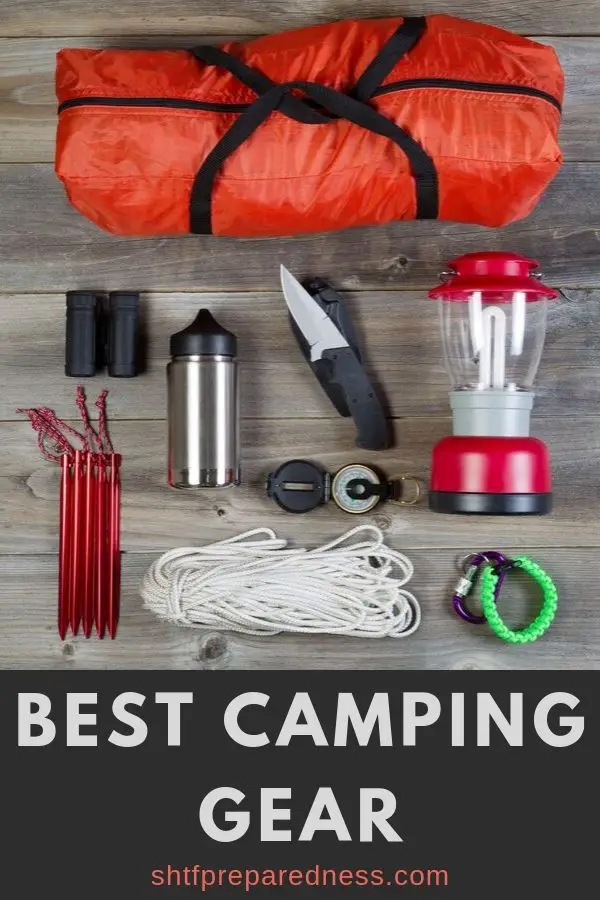
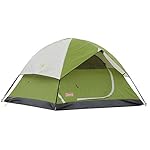
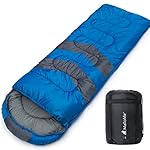
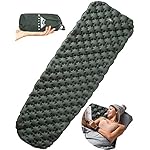
![Best Camping Gear For Your Next Adventure 7 GearLight LED Headlamp Flashlight S500 [2 PACK] - Running, Camping, and Outdoor Headlamps - Best Head Lamp with Red Safety Light for Adults and Kids](https://images-na.ssl-images-amazon.com/images/I/51JkYXqF2HL._SS150_.jpg)



